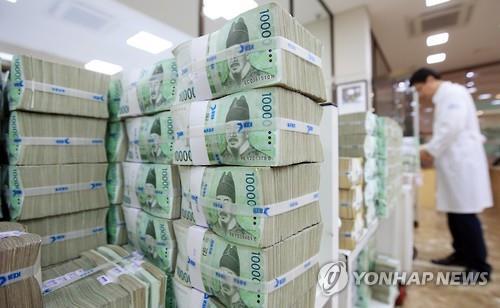South Korea posted the first on-year drop in per capita income last year largely due to the weakening of the Korean won against the greenback, which dragged the dollar-converted value of national income, the central bank said Friday.
According to the Bank of Korea on Friday, Asia’s fourth-largest economy expanded 2.6 percent in 2015 from the previous year, the slowest pace since 2012.

Last year, the nation’s per capita gross national income fell 2.6 percent to $27,340 from $28,071 a year ago.
Despite the gradual increase after the financial crisis, the reading has stayed below $30,000 for the past nine years since it first breached $20,000 in 2006.
The decline in per capita GNI — a gauge of measuring the actual purchasing power of the population — was mostly attributed to the local currency, which suffered a 7.4 percent drop in value against the dollar in 2015.
“The rise in won-dollar exchange rate caused the drop in per capita income fall when it was converted to the U.S. greenback … the slowdown in exports also had an impact on GNI,” said Jeon Seung-cheol, head of BOK’s economic statistics department.
In terms of the local currency, per capita GNI gained 4.6 percent on-year to 30.94 million won last year, breaching the 30 million-won mark for the first time in the country’s history, the BOK said.
Similarly, personal gross disposable income, which measures people’s purchasing power, grew 4.7 percent from the previous year to 17.57 million won in 2015. Its value in terms of the U.S. greenback slipped 2.5 percent on-year to $15,524.
Korea’s real economic growth rate rose 2.6 percent on-year last year, compared to a 3.3 percent expansion in the previous year.
Stung by sluggish exports, which account for about half of the country’s GDP, the 2015 reading marked the slowest pace since 2012 when the figure stood at 2.3 percent.
“The government implemented policies to support domestic demand and counter external shocks, but exports still weighed on growth,” Jeon said.
Exports were up 0.8 percent from the previous year, compared to a 2 percent on-year increase in 2014, as overseas shipments of LDC panels and ships had dipped during the period.
The central bank earlier forecast that the local economy will grow 3 percent in 2016, down from a previous 3.2 percent forecast.
By Park Han-na (hnpark@heraldcorp.com)



